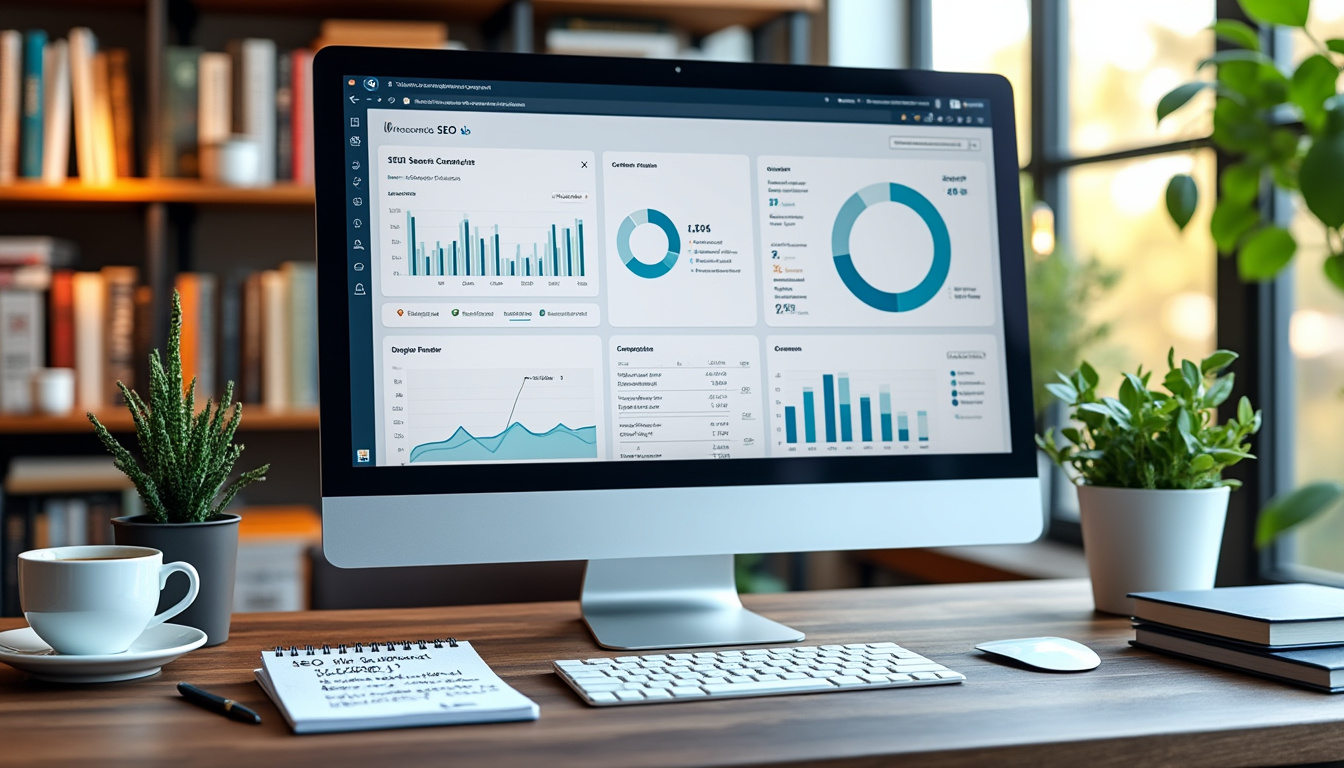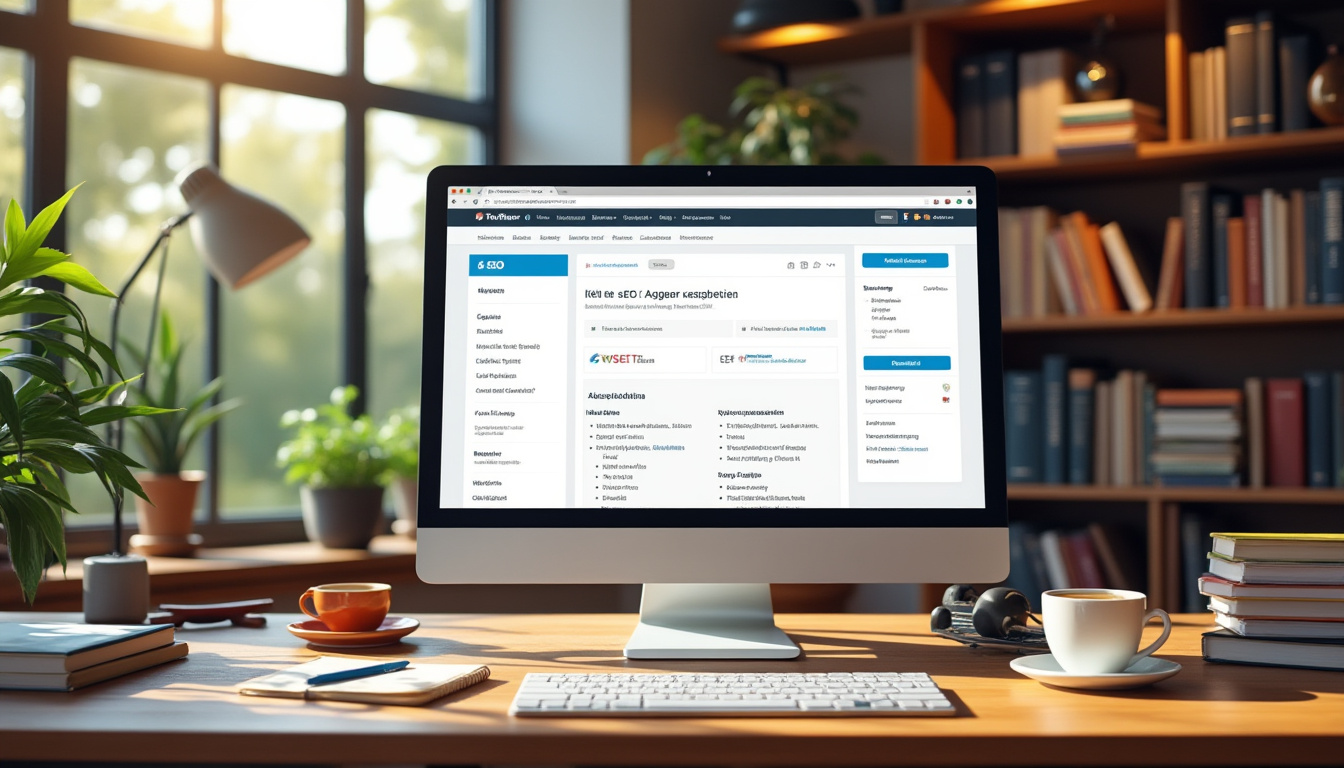To enhance the SEO performance of your WordPress site, focus on a few essential practices. First, regularly update your content, as fresh posts tend to attract higher search rankings. Consider optimizing settings by checking the visibility options and selecting an SEO-friendly theme. Utilizing top-notch SEO plugins can also streamline your optimization process. Organizing your content through categories and tags, along with a clean URL structure, will make navigation easier for users and search engines alike. Lastly, prioritize the creation of high-quality content that resonates with your audience to ensure better engagement and increased visibility.
Optimizing your WordPress site for SEO performance is essential for improving your online visibility and attracting more visitors. This comprehensive guide will walk you through effective strategies and best practices that can elevate your site in search engine rankings. By implementing these techniques, you can ensure that your content reaches a wider audience and ranks higher on search engines like Google, Bing, and others.
Understanding SEO and Its Role
Search Engine Optimization (SEO) is the process of improving a website’s visibility on search engine results pages (SERPs). It involves a combination of techniques aimed at optimizing various aspects of your site, making it easier for search engines to crawl and index your content. A well-optimized WordPress site not only attracts more traffic but also engages users effectively, leading to higher conversion rates.
Choosing an SEO-Friendly Theme
The foundation of your WordPress site starts with choosing the right theme. An SEO-friendly theme should be responsive, fast-loading, and well-coded. Select a theme that adheres to best coding practices and provides a clean structure for better indexing by search engines. Numerous themes available have built-in SEO features, providing further advantages for your site’s optimization.
Configuring Your WordPress Settings Properly
Proper configuration of your WordPress settings is crucial for SEO performance. Ensure that your site is visible to search engines by checking your visibility settings. To do this, navigate to the ‘Settings’ section and uncheck the option preventing search engines from indexing your site. Additionally, consider adjusting your permalinks for more SEO-friendly URLs. Opt for structures that incorporate your post titles, making them readable and relevant.
Creating High-Quality Content
Content is the backbone of your SEO efforts. Focus on creating high-quality, valuable content that addresses the needs and interests of your audience. Use a conversational tone and keep your content engaging. Regularly update your blog with new posts to signal search engines that your site is active. The frequency of your content updates can positively influence your search rankings.
Utilizing Keywords Effectively
To enhance your SEO, understanding and effectively integrating keywords is key. Research relevant keywords associated with your content and incorporate them naturally throughout your posts. Use keyword tools to find terms with appropriate search volume and competition. Remember, it’s essential to avoid keyword stuffing; focus on creating content that sounds natural while incorporating these keywords.
Employing Appropriate Tags and Categories
Organizing your content helps both users and search engines. Utilize tags and categories effectively to structure your content within WordPress. Assign categories to broader topics and use tags for specific details related to your posts. This not only aids in organization but also enhances the chances of your content being discovered by users navigating through your site.
Optimizing Your Images
Images can significantly improve user experience, but if not optimized, they can slow down your site. Ensure all images are properly sized and formatted for web use. Use descriptive alt text for each image, incorporating relevant keywords to improve your SEO. This practice provides context to search engines and also enhances accessibility for those utilizing screen readers.
Utilizing SEO Plugins
WordPress offers various SEO plugins designed to enhance your optimization efforts. Plugins like Yoast SEO and All in One SEO Pack simplify the process of improving your site’s SEO performance. These tools provide recommendations on optimizing tags, titles, and meta descriptions, making it easier for you to follow SEO best practices without needing extensive technical knowledge.
Ensuring Technical SEO Is In Place
Technical SEO refers to a range of practices that help search engines crawl, index, and rank your website pages effectively. This includes improving site speed, ensuring mobile-friendliness, and securing your site with HTTPS. Check your site for broken links and rectify any issues promptly, as these can negatively impact your SEO performance.
Improving Site Speed
Site speed is a critical factor in user experience and SEO. A slow-loading website can lead to high bounce rates and decreased rankings. To boost your site’s performance, consider using caching plugins like WP Rocket or NitroPack. These tools can help minimize loading times by storing static versions of your site’s content. Additionally, optimize your images and reduce server response time.
Building Quality Backlinks
Backlinks play a significant role in SEO performance. Focus on building high-quality backlinks by creating shareable and informative content that others want to link to. You can also engage in guest blogging or collaborate with other reputable sites to increase your link profile. Remember, quality matters more than quantity, so prioritize acquiring links from trustworthy sources.
Improving User Experience
A user-friendly site not only pleases visitors but also enhances SEO performance. Pay attention to your site’s navigation, making it easy for visitors to find what they need. Clear call-to-action buttons and an intuitive layout contribute significantly to user experience. Providing a seamless experience encourages users to stay longer on your site, resulting in lower bounce rates.
Monitoring Your SEO Performance
Regularly monitoring your SEO performance is crucial for ongoing improvement. Use tools like Google Analytics and Google Search Console to track your traffic, keyword rankings, and overall performance. Identify areas for enhancement and adjust your strategies as needed. Consistent evaluation helps you stay informed about what works and what doesn’t, allowing for optimized future content.
Integrating Social Media with SEO
Utilizing social media to share your content can increase visibility and drive traffic to your site. Active presence on platforms like Facebook, Twitter, and LinkedIn can position your content in front of a broader audience. Encourage sharing by adding social media buttons to your posts, making it easier for visitors to share your content with their networks.
Implementing Structured Data
Structured data helps search engines understand your content better, enhancing the appearance of your site in search results. Utilize schema markup to provide additional context about your content. This can lead to rich snippets, increasing click-through rates. Implement structured data with plugins or manual coding, depending on your comfort level with technical SEO.
Improving Mobile Responsiveness
As more users access the internet via mobile devices, ensuring your site is mobile responsive is crucial for SEO. A mobile-friendly design not only provides a better user experience but is also favored by search engines in ranking. Test your site on various devices to ensure that your design adapts well to different screen sizes, enhancing usability.
Utilizing Local SEO Practices
If your business operates locally, implementing local SEO practices is essential. Create a Google My Business account to enhance your presence in local search results. Optimize your site’s content with local keywords and add location-specific information. Encourage customer reviews to build credibility and attract more local clients.
Conclusion – Embrace Continuous Improvement
While the steps provided above lay a solid foundation for optimizing your WordPress site for better SEO performance, the realm of search engine optimization is ever-evolving. Stay informed about trends and updates in SEO, continually refining your strategies to keep your site competitive. Remember that effective SEO isn’t a one-time task; it’s an ongoing process that requires patience and adaptability.
For additional resources and a deeper dive into WordPress SEO strategies, explore guides that elaborate on optimizing your WordPress site, such as those found at NitroPack and WP Rocket. Further, enhancing user experience with automatic translations is possible through tools available at WP Translation. Make sure to check documentation and tutorials for setup assistance.

Optimizing your WordPress site for improved SEO performance is essential to enhance online visibility and attract more organic traffic. By implementing effective strategies, you can ensure that your site is favored by search engines. This article will cover several techniques and best practices to boost your site’s SEO capabilities.
Check Your WordPress Visibility Settings
One of the first steps to optimizing your site is to verify your WordPress visibility settings. Go to the Settings menu and click on Reading. Ensure that the option “Discourage search engines from indexing this site” is unchecked. Keeping this option disabled will allow search engines to crawl your site effectively.
Update Permalinks for Clarity
Your permalink structure plays a crucial role in SEO. An effective structure is essential for enhancing the usability of your URLs. To update your permalinks, navigate to the Settings tab, then select Permalinks. Choose a setting that utilizes post names for clearer representations, which helps search engines and users understand the content better.
Create High-Quality, Engaging Content
High-quality content is the backbone of any successful SEO strategy. Focus on creating people-first content that is relevant and engaging. Regularly posting fresh content not only keeps your audience engaged but also signals search engines that your site is active. Aim to answer common questions and address topics that resonate with your visitors.
Utilize Tags and Categories Wisely
Properly organizing your content with tags and categories can significantly enhance your site’s SEO performance. Use categories to group similar content together and tags for specific topics within that content. This logical organization aids search engines in better indexing your articles.
Optimize Images and Media Elements
Images and other media elements can play an essential role in SEO. Ensure that your images are optimized by using descriptive ALT text, which helps search engines understand the context of your images. Additionally, keep image file sizes manageable to improve page loading speeds, as this can affect your overall search ranking.
Focus on Mobile Responsiveness
With the increasing use of mobile devices, having a responsive design is crucial for SEO. Ensure that your WordPress theme is mobile-friendly, allowing visitors to navigate your site seamlessly on any device. Google prioritizes mobile-responsive sites in search results, making this step critical for optimization.
Utilize SEO Plugins for Enhanced Functionality
WordPress offers numerous SEO plugins that can simplify the optimization process. Consider using popular options like Yoast SEO or All in One SEO Pack, which provide tools to guide you through best practices and help enhance on-page SEO features such as meta tags, XML sitemaps, and more.
Monitor Performance and Analytics
Tracking your site’s performance is essential to gauge the effectiveness of your SEO efforts. Utilize tools like Google Analytics to monitor traffic, bounce rates, and user engagement. This data will allow you to identify areas for improvement and adjust your strategies accordingly.
Incorporate Keywords Strategically
Understanding the role of keywords is crucial for optimizing your content. Research and identify relevant keywords for your niche and incorporate them naturally throughout your articles. However, avoid keyword stuffing, as this can lead to penalties by search engines. Focus on creating content that flows naturally while including keywords in headings, subheadings, and the body.
Link Internally and Externally
Building a solid linking structure within your site can significantly boost SEO. Internal links help guide visitors to related content, enhancing user experience. Additionally, including external links to reputable sources adds credibility to your articles and can improve your site’s authority in the eyes of search engines.
By following these practices, you can effectively optimize your WordPress site for better SEO performance. Start implementing these strategies today and watch your site’s visibility grow!
WordPress SEO Optimization Techniques
| Technique | Description |
| Check Visibility Settings | Ensure your site is indexed by search engines. |
| Permalink Structure | Utilize SEO-friendly URLs for better ranking. |
| Quality Content | Create valuable, informative content engaging for users. |
| Use Tags and Categories | Organize content effectively to enhance navigation. |
| Image Optimization | Reduce file sizes and use alt text for images. |
| SEO Plugins | Leverage tools to enhance website performance. |
| Regular Updates | Post new content frequently to boost visibility. |
| Create Backlinks | Build quality links to increase authority and traffic. |
Optimizing your WordPress site for better SEO performance is crucial for enhancing your online visibility and attracting more organic traffic. This guide outlines actionable strategies to improve your website’s SEO, ensuring that search engines can easily discover and index your content. From adjusting settings to creating engaging content, these best practices will provide a solid foundation for effective WordPress SEO.
Check Your WordPress Visibility Settings
Before diving into optimization techniques, it’s essential to check if your site is visible to search engines. Navigate to your WordPress dashboard, go to Settings, and then select Reading. Ensure the option “Discourage search engines from indexing this site” is unchecked. This simple step allows search engines like Google to find and index your content, which is fundamental for any SEO strategy.
Use SEO-Friendly Permalinks
Permalinks determine the URL structure of your posts and pages. A clear and keyword-rich URL structure can enhance your site’s SEO. You can set this in your WordPress settings under Permalinks. Opt for a structure that includes the post name, making it descriptive and relevant to the content. For example, instead of a URL like example.com/?p=123, aim for example.com/optimized-post-name.
Create High-Quality Content
Content is at the heart of SEO, so focus on creating high-quality content that meets the needs of your audience. This means writing informative, engaging posts that answer questions or solve problems. Incorporate relevant keywords naturally but avoid keyword stuffing. The goal is to provide value while ensuring your content is optimized for search engines.
Regularly Update Your Content
Search engines favor sites that are regularly updated with fresh content. To maintain and improve your site’s ranking, develop a consistent posting schedule. While it’s important to publish new content, consider updating existing posts with updated information, statistics, or additional insights. This demonstrates to search engines that your content remains relevant and timely.
Utilize Tags and Categories
Properly organizing your content using categories and tags is vital for better navigation and SEO. Categories help you group related content, making it easier for users and search engines to understand the main topics of your site. Tags should provide specific details about your post. This structure not only assists with SEO but enhances user experience as well.
Optimize Your Images
Images play an essential role in enhancing user engagement, but they can also impact your site’s loading speed and SEO. When uploading images, ensure they are optimized for the web by compressing them without losing quality. Use descriptive alt text for every image, incorporating relevant keywords to help search engines understand the content of your images.
Use SEO Plugins
SEO plugins for WordPress can simplify the optimization process. Popular plugins like Yoast SEO or All in One SEO Pack offer features that guide you towards best practices. They can assist with analyzing your content, managing your XML sitemap, and optimizing your titles and meta descriptions, which are critical components of on-page SEO.
Monitor Your Performance
To understand the effectiveness of your SEO efforts, regularly monitor your site’s performance using tools like Google Analytics and Google Search Console. Keep an eye on key metrics such as organic traffic, bounce rate, and keyword rankings. This data can help you identify areas for improvement and refine your SEO strategies accordingly.
Frequently Asked Questions about WordPress SEO Optimization
What are the key elements to optimize for SEO on my WordPress site? To improve SEO, focus on creating high-quality content, optimizing URL structure, and using tags and categories effectively.
How does updating my WordPress visibility settings affect SEO? Keeping your WordPress visibility settings public allows search engines to index your site, which is essential for higher rankings.
Why is posting new content regularly important for SEO? Regularly posting new content signals to search engines that your site is active, which can improve your search ranking over time.
What should I consider when choosing a theme for SEO? Select an SEO-friendly theme that is responsive, fast-loading, and compatible with SEO plugins.
How can I use plugins to enhance my WordPress SEO? Utilize reliable SEO plugins to help analyze your content, generate sitemaps, and optimize on-page elements easily.
Is it necessary to optimize images for better SEO? Yes, optimizing images and alt text improves load times and helps search engines understand the content of your images.
How can I improve the navigation of my WordPress site for SEO? Implement simple and intuitive navigation to enhance user experience and allow search engines to crawl your site effectively.
What role do keywords play in WordPress SEO? Understanding and utilizing keywords effectively helps in tailoring content that aligns with what users are searching for.
How often should I review my website’s SEO performance? Regularly reviewing your SEO performance, preferably monthly, helps identify areas of improvement and measure the effectiveness of your strategies.
Does social media impact my WordPress SEO? While social media links are not weighted heavily in search rankings, they can drive traffic to your site, potentially improving visibility and rankings.









